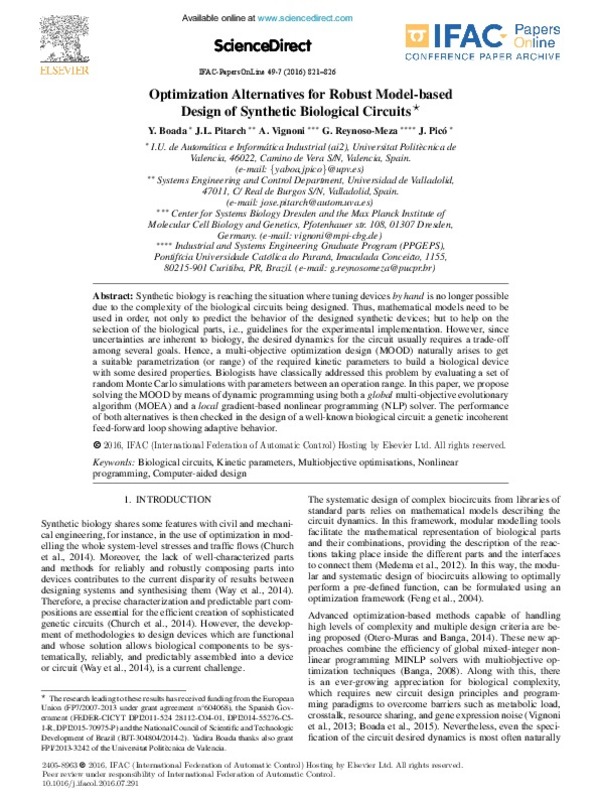Boada-Acosta, YF.; Pitarch Pérez, JL.; Vignoni, A.; Reynoso Meza, G.; Picó, J. (2016). Optimization Alternatives for Robust Model-based Design of Synthetic Biological Circuits. IFAC-PapersOnLine. 49(7):821-826. https://doi.org/10.1016/j.ifacol.2016.07.291
Por favor, use este identificador para citar o enlazar este ítem: http://hdl.handle.net/10251/150450
|
Título:
|
Optimization Alternatives for Robust Model-based Design of Synthetic Biological Circuits
|
|
Autor:
|

 Boada-Acosta, Yadira Fernanda
Boada-Acosta, Yadira Fernanda

 Pitarch Pérez, Jose Luis
Pitarch Pérez, Jose Luis

 Vignoni, Alejandro
Reynoso Meza, Gilberto
Vignoni, Alejandro
Reynoso Meza, Gilberto

 Picó, Jesús
Picó, Jesús
|
|
Entidad UPV:
|
Universitat Politècnica de València. Departamento de Ingeniería de Sistemas y Automática - Departament d'Enginyeria de Sistemes i Automàtica
|
|
Fecha difusión:
|
|
|
Resumen:
|
[EN] Synthetic biology is reaching the situation where tuning devices by hand is no longer possible due to the complexity of the biological circuits being designed. Thus, mathematical models need to be used in order, not ...[+]
[EN] Synthetic biology is reaching the situation where tuning devices by hand is no longer possible due to the complexity of the biological circuits being designed. Thus, mathematical models need to be used in order, not only to predict the behavior of the designed synthetic devices; but to help on the selection of the biological parts, i.e., guidelines for the experimental implementation. However, since uncertainties are inherent to biology, the desired dynamics for the circuit usually requires a trade-off among several goals. Hence, a multi-objective optimization design (MOOD) naturally arises to get a suitable parametrization (or range) of the required kinetic parameters to build a biological device with some desired properties. Biologists have classically addressed this problem by evaluating a set of random Monte Carlo simulations with parameters between an operation range. In this paper, We propose solving the MOOD by means of dynamic programming using both a global multi-objective evolutionary algorithm (MOLA) and a local gradient-based nonlinear programming (NLP) solver. The performance of both alternatives is then checked in the design of a well-known biological circuit: a genetic incoherent feed-forward loop showing adaptive behavior. (C) 2016, IFAC (International Federation of Antomatic Control) Hosting by Elsevier Ltd. All rights reserved.
[-]
|
|
Palabras clave:
|
Biological circuits
,
Kinetic parameters
,
Multiobjective optimisations
,
Nonlinear programming
,
Computer-aided design
|
|
Derechos de uso:
|
Reserva de todos los derechos
|
|
Fuente:
|
IFAC-PapersOnLine. (eissn:
2405-8963
)
|
|
DOI:
|
10.1016/j.ifacol.2016.07.291
|
|
Editorial:
|
Elsevier
|
|
Versión del editor:
|
https://doi.org/10.1016/j.ifacol.2016.07.291
|
|
Título del congreso:
|
11th IFAC Symposium on Dynamics and Control of Process Systems, including Biosystems (DYCOPS-CAB 2016)
|
|
Lugar del congreso:
|
Trondheim, Norway
|
|
Fecha congreso:
|
Junio 06-08,2016
|
|
Código del Proyecto:
|
info:eu-repo/grantAgreement/EC/FP7/604068/EU/Real-time Monitoring and Optimization of Resource Efficiency in Integrated Processing Plants/
...[+]
info:eu-repo/grantAgreement/EC/FP7/604068/EU/Real-time Monitoring and Optimization of Resource Efficiency in Integrated Processing Plants/
info:eu-repo/grantAgreement/CNPq//BJT%2F304804%2F2014-2/
info:eu-repo/grantAgreement/MINECO//DPI2014-55276-C5-1-R/ES/BIOLOGIA SINTETICA PARA LA MEJORA EN BIOPRODUCCION: DISEÑO, OPTIMIZACION, MONITORIZACION Y CONTROL/
info:eu-repo/grantAgreement/UPV//FPI%2F2013-3242/
info:eu-repo/grantAgreement/MICINN//DPI2011-28112-C04-01/ES/MONITORIZACION, INFERENCIA, OPTIMIZACION Y CONTROL MULTI-ESCALA: DE CELULAS A BIORREACTORES/
info:eu-repo/grantAgreement/MINECO//DPI2015-70975-P/ES/INTEGRACION DE OPTIMIZACION Y CONTROL EN PLANTAS DE PROCESOS/
[-]
|
|
Agradecimientos:
|
The research leading to these results has received funding from the European Union (FP7/2007-2013 under grant agreement no604068), the Spanish Government (FEDER-CICYT DPI2011-524 28112-C04-01, DPI2014-55276-C5-1-R, ...[+]
The research leading to these results has received funding from the European Union (FP7/2007-2013 under grant agreement no604068), the Spanish Government (FEDER-CICYT DPI2011-524 28112-C04-01, DPI2014-55276-C5-1-R, DPI2015-70975-P) and the National Council of Scientific and Technologic Development of Brazil (BJT-304804/2014-2). Yadira Boada thanks also grant FPI/2013-3242 of the Universitat Politecnica de Valencia
[-]
|
|
Tipo:
|
Artículo
Comunicación en congreso
|









